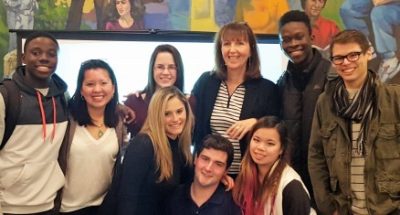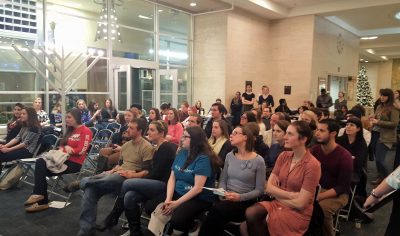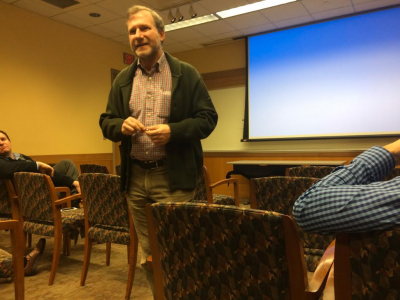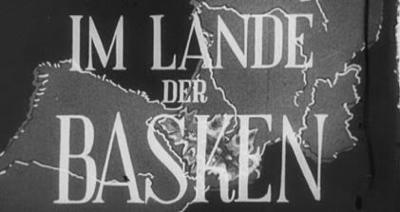On February 9th, Professor Ally Ladha took the floor at the Humanities Institute to deliver a talk titled “Hegel and the
Professor Ladha and Professor Michael Lynch, director of the Humanities Institute, discussing Tuogo’s installation.Postcolonial State: Aesthetics, Subjectivity, and the Idea of Freedom.” Professor Ladha –UConn Faculty Fellow and Assistant Professor of French and Francophone Studies – offered what he called a radical reinterpretation of German philosopher Georg Wilhelm Friedrich Hegel’s writings related to history and African subjectivity.
The talk began with a Hegelian meditation on an installation by artist Barthélemy Tuogo, realized at the 2014 Biennale of Contemporary African Art in Dakar. The piece, titled “The Last Supper,” consists of a bau bau-shaded courtyard containing fifty-four stools – representing either the group of fifty-four African nations comprising the African Union, or the distinct group of fifty-four African member states of the United Nations – surrounding a garden of red beans in the shape of the African continent. The arrangement of the stools around the garden, which itself is neatly outlined by a groove carved into the dirt, evokes a scene of consumption-in-potentia – the continent a feast for the powers that frame it. This installation, Ladha explained, by analogy, raises questions on the content and shape of the African subject in a postcolonial climate.
Professor Ladha and Professor Michael Lynch, director of the Humanities Institute, discussing Tuogo’s installation.Professor Ladha then drew on documentation of Hegel’s lesser known spoken lectures to provide a nuanced rearticulation of some of the philosopher’s most frequently misconstrued arguments on the master-slave dialectic, outlined in his foundational text The Phenomenology of Spirit. Far from justifying the subjugation of so-called ahistorical peoples, Ladha suggested, Hegel’s philosophical system offers a powerful framework in which we may better interrogate the dialectics of freedom in a postcolonial age.


 held a screening of his recent documentary film project titled Basque Swastika (in Spanish, Una esvástika sobre el Bidasoa). The 2013 film, directed by Javier Barajas and Alfonso Andrés Ayarza, is a fascinating exercise in metacinema, exploring the context and significance of a long-lost Nazi documentary on the topic of the Basque nation.
held a screening of his recent documentary film project titled Basque Swastika (in Spanish, Una esvástika sobre el Bidasoa). The 2013 film, directed by Javier Barajas and Alfonso Andrés Ayarza, is a fascinating exercise in metacinema, exploring the context and significance of a long-lost Nazi documentary on the topic of the Basque nation.